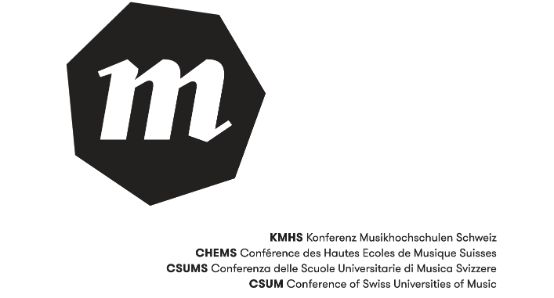MA in Specialized Music Performance in Geneva and Lausanne
The current issue takes a look at the MA Specialized Music Performance study programmes at the music academies of Geneva/Neuchâtel and Lausanne in French-speaking Switzerland. Students talk about their development within and experience of the course.

Matthias von Orelli - The Master of Arts in Specialized Music Performance at the Haute École de Musique Genève - Neuchâtel (HEM) and at the Haute Ecole de Musique de Lausanne (HEMU - Vaud, Valais, Fribourg) are structured identically within the framework of the University of Applied Sciences and Arts Western Switzerland (HES-SO), but sometimes have different study focuses. At both schools, the course is open to a limited number of students, and primarily students with outstanding artistic abilities are admitted to the course. In Geneva, two aspects in particular are taken into account for admission: a remarkable artistic personality and/or the ability to contribute innovative research approaches in the field of musical performance practice.
There are different specializations within the Geneva Master's degree course. For example, conducting, where the aim is to be able to lead a professional ensemble after graduation, be it a symphony orchestra, a chamber orchestra, an opera ensemble or a specialized ensemble. The prerequisite is mastery of an orchestral instrument or playing the piano, as well as practical knowledge of instrumental and vocal music, an understanding of stylistic issues and a high level of artistic sensitivity. At the same time, knowledge of repertoire and score reading are also expected. Another point is the ability to plan rehearsals and implement them accordingly - a very extensive and demanding profile overall. The Argentinian Nicolás-Eduardo Duna is studying for a Master d'interprétation spécialisée orientation direction d'orchestre in Laurent Gay's class in Geneva. He does not describe himself as a child prodigy, nor does he come from a family of musicians. It was "only" at the age of twelve that he became interested in music and consequently decided to make music his profession. At the age of sixteen, he decided to train as a conductor, which he supplemented with private piano lessons and participation in a choir. A gradual approach to the world of music, which, as Duna herself says, was more about dedication than talent. Based on her own online research, Duna became aware of the Master's program in Geneva, which meant continuing her studies in Europe.
Duna believes it is particularly important to bring extensive experience with you to your studies and to demonstrate comprehensive knowledge of music, be it harmony, counterpoint or orchestration. He is now enjoying this education at what he describes as an excellent Swiss music academy, including the exciting collaborations with the Orchestre de Chambre de Genève and the ZHdK. His only regret is that sometimes everything happens almost too quickly for him to be really well prepared in front of the orchestra. After completing his studies, he would like to continue with a Master's degree in music theory or pedagogy, while at the same time preparing for auditions and conducting competitions.
The above-mentioned requirements are also part of the choral conducting specialization, whereby either vocal training or piano playing is required. The aim of this specialization is to lead a professional choral ensemble (whether an opera or radio choir, or a specialist ensemble).
The medieval music course in Geneva deserves special attention, as it deals with philological fields of research in addition to practical questions. The focus is on musical practice and its special features with regard to various playing techniques, ornamentation and improvisation. In this way, the specialization takes account of the growing enthusiasm for early music in recent years. As research in this field has gained a great deal of knowledge, the course aims to provide as broad an insight into the field as possible, so that cultural, technical and theoretical knowledge is promoted in equal measure. This also includes musical practice on historical instruments, as this differs greatly from that on modern instruments, which can be illustrated by the choice of keyboard instruments, where harpsichord, clavichord, fortepiano or organ are available.
The MA in Specialized Music Performance can also be found at the Haute École de Musique de Lausanne (HEMU), and the career of Swiss singer Marina Viotti impressively illustrates the diverse range of courses on offer there. The daughter of a musical couple, she came into contact with concerts and opera at an early age. But when she wanted to become a singer at the age of seven, her parents thought it was too early - she should play the flute first. She did so, then studied literature and philosophy in Lyon and also sang in a metal band. At the age of 21, she went to Marseille to study cultural management, but supplemented this with training in choral conducting, whereupon the teacher said she should sing. Although she was comparatively old at the time, she took the plunge, moved to Vienna and studied privately with Heidi Brunner because the university there did not approve her application due to her late start with singing. She studied in Vienna for three years, worked at the Vienna State Opera and again sang in a choir. The decision to study in Lausanne was linked to the desire to give her life a clear structure. This was followed by a Master's degree with Brigitte Balleys, which she completed last year. For Viotti, the great advantage of her studies (in addition to the network she built up, the numerous support she received from the university and the experience she gained) is that she has already been able to sing her first recitals, oratorios and even roles at the Opéra de Lausanne. Everything she learned at the university (such as body expression, phonetics, improvisation, singing, acting) she was able to put into practice straight away. And the orchestral concert at the end of her studies was certainly a highlight.
What struck Marina Viotti was that the course offered guidelines on the one hand, but on the other allowed a great deal of flexibility to develop within them. This development also includes the crossover projects, where concerts combine classical, pop and jazz, projects with contemporary music and master classes with a focus on baroque are offered, or students can perform at the École de Jazz et de Musique Actuelle. Viotti considers these cross-border projects to be particularly beneficial in today's world. As Nicolás-Eduardo Duna has already highlighted for Geneva, this includes collaborations - in Lausanne, for example, with the Orchestre de Chambre de Lausanne or the Opéra de Lausanne. Viotti considers auditions at the Opéra in particular to be a great luxury compared to other music academies. Viotti completed her three-year Master's degree in 2016, enriched with an extensive network and initial professional experience. This is probably one of the reasons why her calendar is full for the next two years, mainly in Switzerland with opera productions in Lausanne, Geneva and Lucerne, but also with concerts and two opera productions abroad.
The requirements for Master's students at the HEMU Lausanne are comparable to those in Geneva, as the intention in Lausanne is also to offer the Master's to a small number of students who have outstanding abilities and aspire to a career at the highest level. One of the highlights of the Master's program is a CD production, which particularly inspired the Moldovan Alexandra Conunova. The winner of the International Joseph Joachim Violin Competition in Hanover and the Tchaikovsky Competition in Moscow did not actually intend to do a second Master's degree. But when the opportunity arose to study with Renaud Capuçon, she changed her mind. Conunova emphasizes that the freedom to plan her studies according to her own schedule is a great advantage, as the focus is clearly on the instrument. After completing the two years of study, a complete CD recording is produced, which means actually designing it herself. This requires creativity in the cover layout, linguistic skill in the formulation of the booklet text and the description of the recorded works, as well as a technical understanding of the high-quality recording and its editing. A very challenging job, but also a unique and important experience that the HEMU makes possible for its students. For Conunova, the Master's was an important stepping stone. She now works with four agencies that represent her in four countries. She believes that she was lucky to have met the right people at the right time. And the goal has remained the same for years: to be happy herself and to share her honest way of making music with others. She herself wants to continue to understand and study what makes up the life and works of a composer - her Master's degree has encouraged her in all of this.








